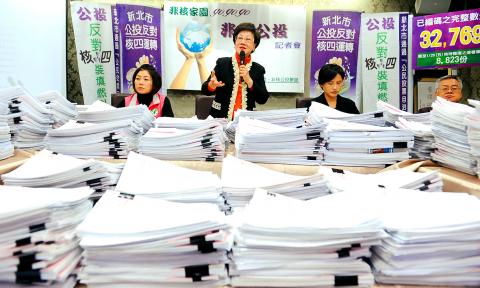Former vice president Annette Lu (呂秀蓮) yesterday urged President Ma Ying-jeou (馬英九) to hold an open dialogue with people petitioning for an anti-nuclear referendum to explain the government’s policy on nuclear energy.
“If more than 100,000 people signed the petition, Ma would be obligated to publicly explain his policy,” Lu, who had initiated an anti-nuclear referendum in New Taipei City (新北市), told a press conference.
Lu said her office has collected 32,769 signatures, considerably more than the minimum of 16,000 required to submit a referendum proposal, and would keep working on the second phase, which requires 160,000 signatures in six months for a referendum to be held.

Photo: Chang Chia-ming, Taipei Times
The former vice president also defended a controversial initiative to combine the referendum with the local elections next year, saying that as the referendum is expected to be held in August next year, the timing would be only three to four months away from the local elections and it makes sense to combine the two to save money.
Lu said she did not rule out organizing a rally on May 20 on Ketagalan Boulevard and demanding an open dialogue with Ma on the nuclear issue.
DPP Legislator Cheng Li-chiun (鄭麗君) said that if the Chinese Nationalist Party (KMT) ignored the opinion of residents of Taipei, New Taipei City and Keelung — 63 percent of whom support stopping the construction of the Fourth Nuclear Power Plant in Gongliao (貢寮), according to a recent survey — KMT lawmakers representing these constituencies should be recalled.
.

Alain Robert, known as the "French Spider-Man," praised Alex Honnold as exceptionally well-prepared after the US climber completed a free solo ascent of Taipei 101 yesterday. Robert said Honnold's ascent of the 508m-tall skyscraper in just more than one-and-a-half hours without using safety ropes or equipment was a remarkable achievement. "This is my life," he said in an interview conducted in French, adding that he liked the feeling of being "on the edge of danger." The 63-year-old Frenchman climbed Taipei 101 using ropes in December 2004, taking about four hours to reach the top. On a one-to-10 scale of difficulty, Robert said Taipei 101

Nipah virus infection is to be officially listed as a category 5 notifiable infectious disease in Taiwan in March, while clinical treatment guidelines are being formulated, the Centers for Disease Control (CDC) said yesterday. With Nipah infections being reported in other countries and considering its relatively high fatality rate, the centers on Jan. 16 announced that it would be listed as a notifiable infectious disease to bolster the nation’s systematic early warning system and increase public awareness, the CDC said. Bangladesh reported four fatal cases last year in separate districts, with three linked to raw date palm sap consumption, CDC Epidemic Intelligence

US climber Alex Honnold left Taiwan this morning a day after completing a free-solo ascent of Taipei 101, a feat that drew cheers from onlookers and gained widespread international attention. Honnold yesterday scaled the 101-story skyscraper without a rope or safety harness. The climb — the highest urban free-solo ascent ever attempted — took just more than 90 minutes and was streamed live on Netflix. It was covered by major international news outlets including CNN, the New York Times, the Guardian and the Wall Street Journal. As Honnold prepared to leave Taiwan today, he attracted a crowd when he and his wife, Sanni,

Taiwanese and US defense groups are collaborating to introduce deployable, semi-autonomous manufacturing systems for drones and components in a boost to the nation’s supply chain resilience. Taiwan’s G-Tech Optroelectronics Corp subsidiary GTOC and the US’ Aerkomm Inc on Friday announced an agreement with fellow US-based Firestorm Lab to adopt the latter’s xCell, a technology featuring 3D printers fitted in 6.1m container units. The systems enable aerial platforms and parts to be produced in high volumes from dispersed nodes capable of rapid redeployment, to minimize the risk of enemy strikes and to meet field requirements, they said. Firestorm chief technology officer Ian Muceus said